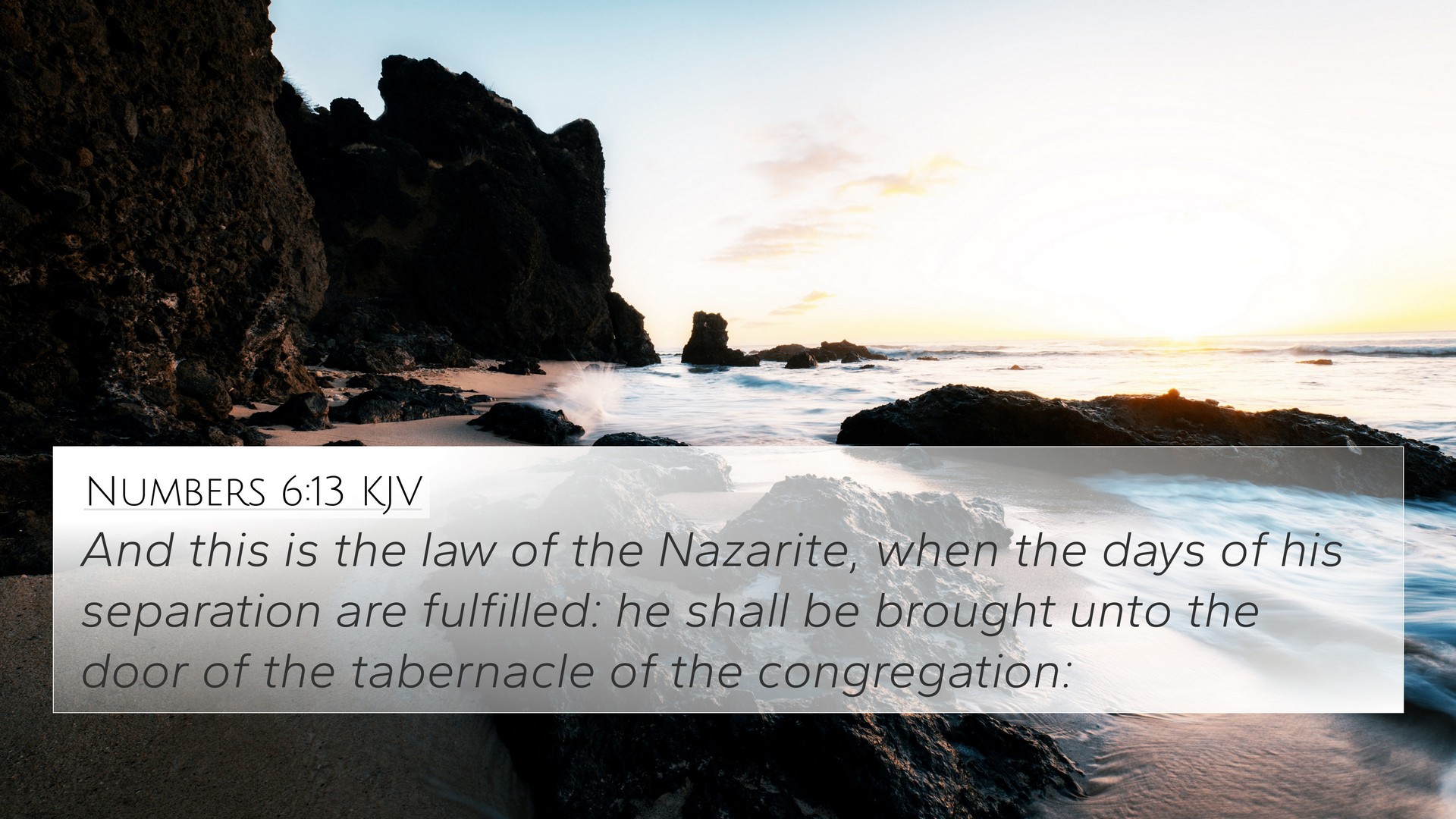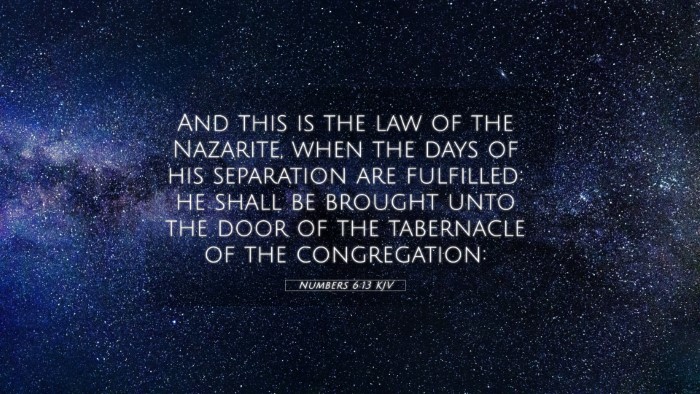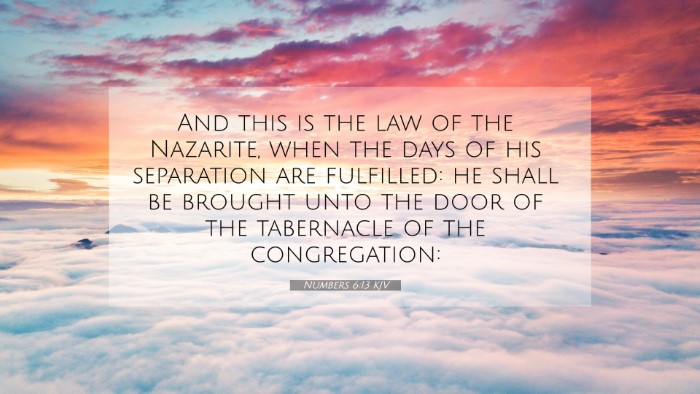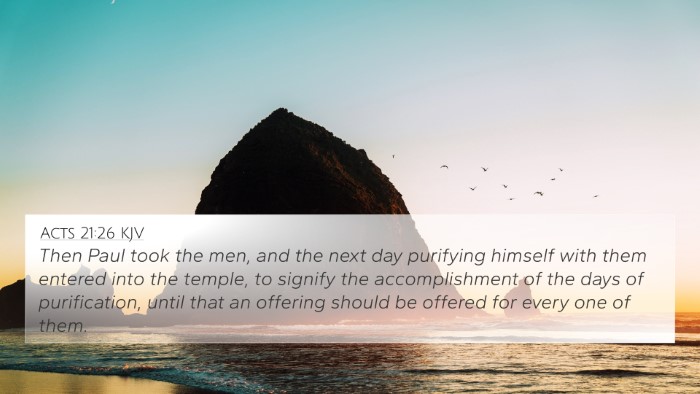Meaning and Interpretation of Numbers 6:13
Numbers 6:13 states: "And this is the law of the Nazarite: when the days of his separation are fulfilled, he shall be brought to the door of the tabernacle of meeting."
This verse is a crucial part of the Nazarite vow, which signifies a period of sanctification and separation unto God. Here, we can explore the implications and interpretations provided by renowned public domain commentaries.
Contextual Overview
In the book of Numbers, which details the Israelites' journey and their covenant with God, the Nazarite vow emerges as a means of expressing devotion and commitment. This vow could be undertaken by anyone—man or woman—seeking greater closeness to God. The vow consists of specific restrictions and rites, reflecting a deep commitment to holiness and separation from worldly influences.
Insights from Biblical Commentaries
- Matthew Henry's Commentary:
Henry emphasizes the significance of the Nazarite's appointment and the seriousness of their commitment. The individual is fully separated for the Lord’s service, which highlights a life devoted to spiritual pursuits over mundane affairs. The mention of the "door of the tabernacle" denotes the public acknowledgment of one's vow—a formal return to community after a period of intense devotion.
- Albert Barnes' Commentary:
Barnes underscores that the Nazarite vow serves as an underlying principle of personal holiness that resonates throughout Scripture. He notes that this act of bringing the individual to the tabernacle signifies divine acceptance and community restoration. It reflects God's desire for personal commitment while maintaining fellowship with others.
- Adam Clarke's Commentary:
Clarke provides additional insights by elaborating on the ritual process involved at the conclusion of the Nazarite vow. He illustrates how this act of separation is not merely a withdrawal from society but also a reaffirmation of faith through tangible expressions of devotion and service. Clarke reminds readers that such vows should always align with personal faith and societal responsibilities.
Bible Verse Cross-References
To gain a fuller understanding, it’s beneficial to explore verses that share thematic connections or offer complementary insights. Here are some cross-references relevant to Numbers 6:13:
- Judges 13:5: Discusses the birth of Samson, who was to be a Nazarite from birth, indicating the seriousness of the vow and its implications for life purpose.
- Acts 18:18: Mention of Paul shaving his head in Cenchrea because of a vow shows the continuation of Nazarite practices in the New Testament church.
- 1 Peter 2:9: Compares the separated life of a believer to that of the Nazarite, affirming the call to be a "royal priesthood" set apart for God's purpose.
- Romans 12:1: Exhorts believers to present their bodies as a living sacrifice, paralleling the concept of personal commitment encapsulated in the Nazarite vow.
- Luke 1:15: Describes John the Baptist as one who would be great in the sight of the Lord and filled with the Holy Spirit, emphasizing the individual’s separation to God even before birth.
- 1 Corinthians 6:19-20: Highlights the idea that believers are not their own, similar to the Nazarites, who were dedicated to the Lord and His service.
- Hebrews 7:26: Speaks of Jesus as a High Priest who is holy, blameless, and separate from sinners, linking the sanctity of the Nazarite with Christ's righteousness.
Thematic Bible Verse Connections
This exploration extends into broader themes within Scripture, underscoring the importance of holiness, separation, and dedication to God. The Nazarite life echoes throughout the biblical narrative, and here are some thematic connections:
- Holiness: Reflected in both Old and New Testament teachings, emphasizing a life dedicated to God.
- Separation from Worldliness: Seen throughout biblical texts that call for believers to be "in the world but not of the world."
- Consecration: Many figures in Scripture, such as Samuel and David, experienced periods of separation to fully devote themselves to God’s service.
- Community Acknowledgment: The public aspect of vows reflects the importance of community in supporting individuals in their spiritual journeys.
Tools for Bible Cross-Referencing
For those interested in studying the cross-references and connections between verses, the following resources can be invaluable:
- Bible Concordances: Reference materials that help identify where words appear across the Scriptures.
- Cross-Reference Bible Study Guides: These guides simplify the process of linking verses together thematically.
- Bible Chain References: A method of tracing specific themes or concepts throughout the Bible.
Conclusion
Numbers 6:13 provides a profound glimpse into the practice of the Nazarite vow, encapsulating themes of holiness, dedication, and community. By utilizing cross-referencing tools and understanding the narrative context, believers can deepen their appreciation for what it means to live a life set apart for God’s purpose. Whether through individual study or communal exploration, the connections between Scripture illuminate the intentionality behind a life devoted to Christ.



